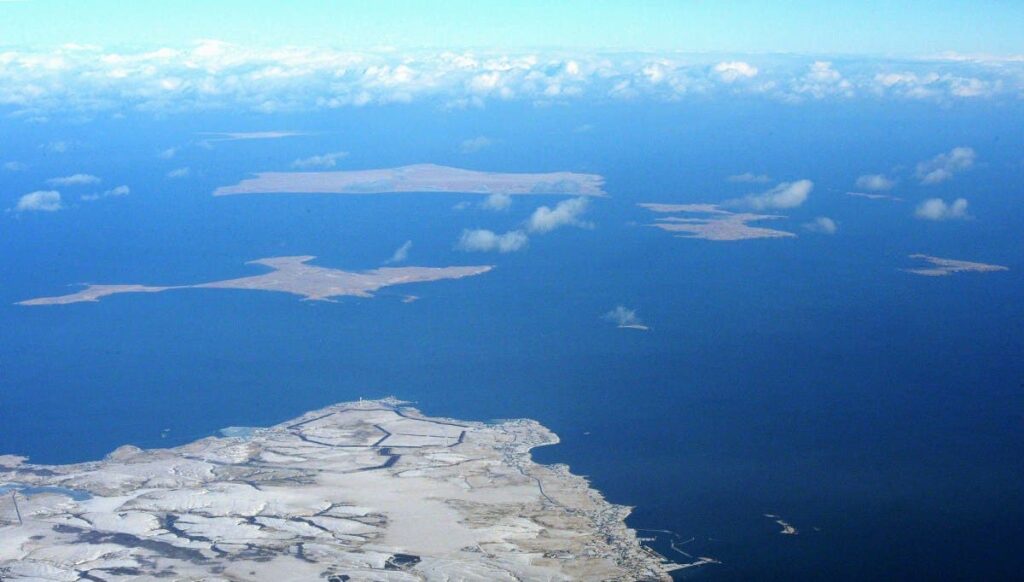Russia has reportedly decided to prohibit foreign ships from exercising the right of innocent passage—granted under an international treaty—in waters surrounding a disputed group of islands in the country’s Far East that Japan claims as its territory.
The Sankei Shimbun reported that Tokyo has lodged a protest with Moscow through diplomatic channels. Newsweek has emailed Russia’s Foreign Ministry for comment.
Why It Matters
The territorial dispute between Russia and Japan centers on the four southernmost Kuril Islands, located between Japan’s island of Hokkaido and Russia’s Kamchatka Peninsula. The islands, originally controlled by Japan as the Northern Territories, were seized by the Soviet Union in 1945 and have remained under Russian control since.
According to the United Nations Convention on the Law of the Sea (UNCLOS), which established an international legal framework governing activities for the world’s oceans, ships of all countries enjoy the right of innocent passage through territorial waters, which generally extend up to 13.8 miles from a coastline.
Innocent passage is defined as “continuous and expeditious” and not prejudicial to the coastal country’s peace, good order or security. The UNCLOS states that a coastal country may temporarily suspend the innocent passage of foreign ships in designated areas of its territorial waters if such a suspension is essential for its security.
What To Know
Citing Japan’s Foreign Ministry, the Sankei Shimbun reported that Russia’s suspension of the right of innocent passage around the disputed islands has been in effect since Monday, applying to foreign naval and government vessels not registered in Russia.
In addition to the remote islands—Shikotan, Kunashiri, Habomai and Etorofu—Russia has banned the right of innocent passage in waters east of Hokkaido, the northernmost of Japan’s four main islands. It remains unclear how long the suspension will last.
While Russia did not provide reasons for the suspension, the report said the Russian military has scheduled “firing exercises” north of Shikotan Island from October 10 to November 1, coinciding with a Japanese war game set to take place across the country.
Innocent passage can be temporarily suspended if it is essential to safeguard the coastal country’s security, including during weapons exercises, according to the UNCLOS. However, the suspension takes effect only after it has been duly published.
This was not the first time Russia has announced war games around the southern Kuril Islands, having done so in April, June, July and August, the report said. Japan protested that Russia’s latest moves were “incompatible” with Tokyo’s position on the islands.
In response to Japan’s accusation of illegal occupation, the Russian Foreign Ministry said in August that the southern Kuril Islands were “transferred” to the Soviet Union on legal grounds under postwar agreements of the allied powers and the U.N. Charter.
In February 1945, during the Yalta Conference with the United States and the United Kingdom, the Soviet Union agreed to declare war on Japan after Germany surrendered, on condition that the Kuril Islands “shall be handed over to the Soviet Union.”
The Japanese government has long insisted that the Soviet Union violated its neutrality pact with Japan when it entered the war. It accused Moscow of occupying the Northern Territories, despite Tokyo’s acceptance of the Potsdam Declaration to surrender.
What People Are Saying
The United Nations Convention on the Law of the Sea states: “Passage is innocent so long as it is not prejudicial to the peace, good order or security of the coastal State…The coastal State may, without discrimination in form or in fact among foreign ships, suspend temporarily in specified areas of its territorial sea the innocent passage of foreign ships if such suspension is essential for the protection of its security, including weapons exercises.”
Russian Foreign Ministry spokeswoman Maria Zakharova said in August: “The southern Kuril Islands were transferred to the USSR, the successor state of which is the Russian Federation, on the legal grounds enshrined in the post-war agreements of the Allied Powers and the U.N. Charter.”
Japan’s Foreign Ministry wrote on its website: “The Government of Japan has energetically been continuing negotiations with Russia based on its basic policy of resolving the issue of the attribution of the Four Northern Islands and concluding a peace treaty with Russia.”
What Happens Next
It remains to be seen whether Russia will bolster its military presence around the southern Kuril Islands and how Japan, a key U.S. security ally, will respond.
Read the full article here














